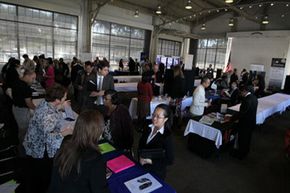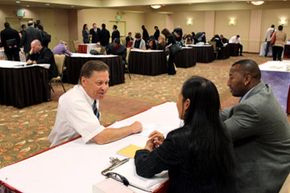The scene is the same across the country -- eager men and women in suits and business skirts, résumés in hand, waiting for hours in long lines for entrance to a job fair. Three years into the global recession, the United States is still losing jobs faster than it can create them. For laid-off workers, job fairs represent one of the few opportunities to meet face-to-face with companies that are actually hiring.
At a job fair, dozens or even hundreds of companies send recruiters to promote their business, advertise job openings, screen potential candidates and collect resumes. Some job fairs are targeted to college students and recent graduates, while others are aimed at a particular job sector, like health care, education or hospitality. Still others are organized especially for women or minority applicants. In this tight job market, attendance at all job fairs has skyrocketed.
Advertisement
At an overcrowded job fair, a successful applicant has to figure out how to stand out from the horde. Since there usually isn't time for a formal, sit-down interview at a job fair, you need to quickly show the recruiter that you're prepared and professional. One of the best ways to do that, the experts say, is by asking intelligent, informed questions [source: Lorenz].
Career experts agree that the worst questions you could ask at a job fair or interview is how much money you'll make or how many vacation days you'll receive [source: Hering]. You don't even have the job yet and you're already asking about days off? Although the absolute worst question has to be: Do you run background checks? Uh, why do you ask?
We've assembled a list of 10 questions that will help get you noticed -- in a good way -- at a job fair. Each question opens the door to a conversation about the skills you'd bring to the table as an employee. But before we get to the first question, you have a little homework to do. Read more about it on the next page.





